 MyDogBreeds
MyDogBreedsWire Fox Terrier is originated from United Kingdom but Australian Cattle Dog is originated from Australia. Wire Fox Terrier may grow 11 cm / 4 inches shorter than Australian Cattle Dog. Wire Fox Terrier may weigh 7 kg / 15 pounds lesser than Australian Cattle Dog. Both Wire Fox Terrier and Australian Cattle Dog has almost same life span. Both Wire Fox Terrier and Australian Cattle Dog has almost same litter size. Wire Fox Terrier requires Moderate maintenance. But Australian Cattle Dog requires Low maintenance
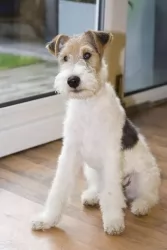 The wire fox terrier was developed in England by fox hunting enthusiasts. They wanted a feisty dog that could chase foxes down their burrows.
The wire fox terrier was developed in England by fox hunting enthusiasts. They wanted a feisty dog that could chase foxes down their burrows.
It is thought that the dog descended from the rough-coated black and tan working terriers of Wales.
The dog wasn’t popular as a pet until the 1930s when its appearance in certain films gave it a popularity-boost.
During the 19th century, in the New South Wales, lived a cattle farmer Thomas Hall. He wanted to have a perfect cattle dog so he mixed two breeds: dogs used by stockman with the dingo. The new breed was given an interesting name - Halls Heelers. Heelers was a part of the dog breed because this new breed of the dog inherited the nipping instinct. As time passed, one breed was developing in two breeds: the Australian Cattle Dog and the Australian Stumpy Tail Cattle Dog.
The Australian Cattle dog can be found in two available colours: red and blue. This is how they got their nicknames: Red Heeler and Blue Heeler.
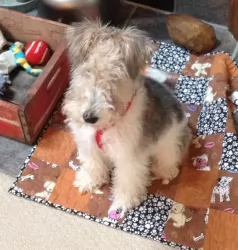 The Wire Fox Terrier is a sturdy, medium-sized dog that weighs between 7 and 9kg and stands between 35 and 39cm at the withers.
The Wire Fox Terrier is a sturdy, medium-sized dog that weighs between 7 and 9kg and stands between 35 and 39cm at the withers.
The dog’s double coat is essentially white with brown or tan markings and can be medium length and wiry, tending to be curly too.
He is a light shedder. The face is long, without much shape and eyes appear to be fairly close together. The ears are fairly small and they fold forward toward the cheeks. The tail is docked and is held high.
This really is an intelligent dog and can’t tolerate being bored. It’s essentially a companion dog too and doesn't want to be separated from his owners for too long.
As a companion dog he is going to want a lot of attention. They’re independent and strong-willed and will benefit from training and socialization.
They are great around children but they do need to be supervised as they are inclined to nip, especially when highly excited. They also bark quite a bit and the owner might have to do something to stop this yapping, especially when the dog is bored.
The Australian Cattle Dog originally mixed with Australian herding dog that was kept near the cattle to guide them. Medium-sized, with the short coat, this dog is generally easy to groom and maintain. It does require more brushing during the shedding period, but it is still not an everyday need. He is easy to train because he likes challenging games and activities which are. It gets very attached to its owner, and he is always protective of them and their possessions. The most common health problems happen with their ears and eyes, but they are usually very healthy and they have a long life – up to 15 years.
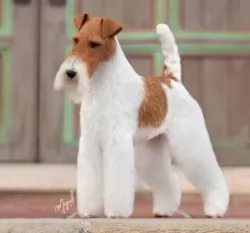 The Wire Fox Terrier is such a canine friend, ready to be with you no matter what you’re doing. They are social dogs and love being involved with their human companions.
The Wire Fox Terrier is such a canine friend, ready to be with you no matter what you’re doing. They are social dogs and love being involved with their human companions.
He is independent but still social and enthusiastic and you can describe him as the ideal family dog.
He is a bundle of energy, and when you bring him into your home, you’re going to get a family member who is playful, joyful, loving and loyal – your very best friend.
Children and Australian Cattle Dogs can grow up together in harmony. They will have a loyal and protective companion. After you properly train your dog and teach your child how to play with the dog, you will bring the friendship on the safe side. Some of them will have the instinct to nip at heels, so you should pay attention to this while training your pet.
Special talents: cattle dog, service dog, therapy dog, police dogs, drug detection dogs.
Australian Cattle Dogs can survive cool, hot and temperate conditions. They can live in a shelter outdoors, and they do well living indoors. But, be aware – without enough physical activity, this dog will end up being frustrated and unhappy.
They will absorb every new trick so quick that you will be amazed. They love to learn, and if you start with some good trick you will raise a great friend and maybe a great competitor in fetch, swim, bring-a-stick, or run-the-show dog sports.
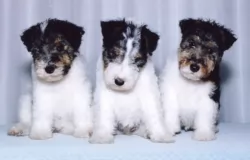 These are healthy dogs, and if you get your dog from a responsible breeder, he will have been checked for health conditions such as cataracts, hip dysplasia, and luxating patellas.
These are healthy dogs, and if you get your dog from a responsible breeder, he will have been checked for health conditions such as cataracts, hip dysplasia, and luxating patellas.
Cataracts are a problem with the lens of the eye. The lens focuses light and it should be crystal clear. A cataract obscures vision. Sometimes the cataract can be very small but other times it can grow to the size of the lens and then it can cause blindness.
Most times, dogs with cataracts can still see, and even though a dog may experience some confusion with a cataract, they don’t hurt the dog. They don’t go away on their own and will need to be removed surgically. If you see your dog has a cataract, consult your vet to get their opinion on the matter.
Your dog may be licking and scratching a lot and it may just be that your dog has a frustrating and irritating skin problem. This itching isn’t a disease but rather a cause of some disease.
There could be so many things that are causing your pet to scratch and it could be a skin disease, parasites or allergies. It can be terrible seeing the frustration it causes your pet and he will certainly need to see the vet.
Health Problems: are mostly inherited. You can avoid this by searching for a good breeder that can clear out the hereditary diseases.
The Australian Cattle Dog is one of the breeds that can be born with progressive retinal atrophy. Progressive rod-cone degeneration is a disease that causes the rods and cones in the retina of the eye to degenerate. It might lead to blindness.
The Australian Cattle Dog is one of the rare breeds with recessive piebald alleles. This gene is the reason why they have white colour on their coat. But, unfortunately, this gene can be the reason why congenital hereditary deafness develops.
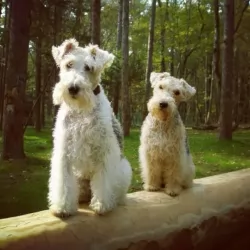 This dog will need to be brushed regularly. Some people hand-strip their dogs. Most people prefer just to take their pets to a professional groomer to have them professionally clipped. The groomers will simultaneously clip his nails, clean the inside of his ears and also clean his teeth.
This dog will need to be brushed regularly. Some people hand-strip their dogs. Most people prefer just to take their pets to a professional groomer to have them professionally clipped. The groomers will simultaneously clip his nails, clean the inside of his ears and also clean his teeth.
The Wire Fox Terrier will expect you to supply him with high-quality dog food if you opt to use commercially manufactured dog food. These foods can be wonderfully convenient but you want the food to be packed with natural ingredients and be high in vitamins and minerals.
Any diet should also be appropriate to the dog’s age, his size, and his activity levels. Some homemade foods can also be a treat but this needs to be simple with no heavy spicing. Things such as boiled chicken, brown rice and vegetables can be an excellent choice.
Herding dog have a history of the joint diseases. That’s why some of the pet suggest feeding a herding dog with meat like chicken, turkey, beef, lamb and fish. Dry dog food, even premium quality, may not be enough for this energetic dogs and their bone structure. But it depends on the dog. The best advice is to always take an advice from your breeder or your wet.
You won’t be very busy with grooming your Australian cattle dog. You don’t have to take everyday care of it. Occasional brushing will be more than enough. Bath the dog only when you notice odour problem.
The Australian Cattle Dog needs a high level of activity. Like many other herding dog breeds, they love walks, spending time with people, running or doing any athletic sports with them, teaching them tricks since they have above average intelligence. Fetching will be super fun for everyone, agility, competitions or any other challenging activity. They love water and they swim very well so you can take the dog with you to the nearest pool and have a great time.